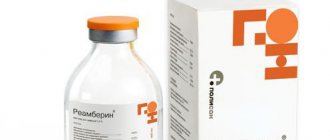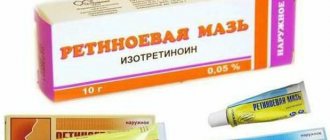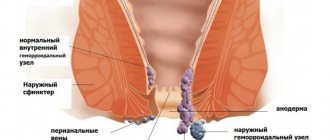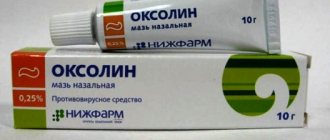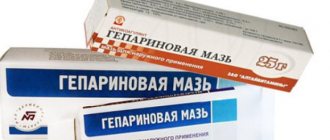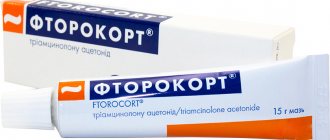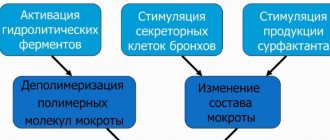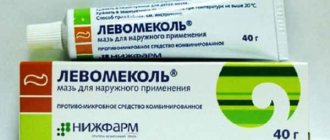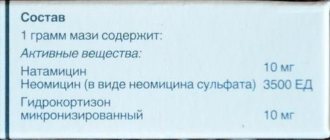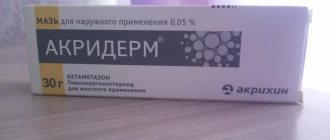Skin diseases are not only an aesthetic discomfort, they are also a whole list of unpleasant and sometimes even dangerous symptoms that cannot be hidden. Treatment for various dermatoses is based on the underlying cause, and topical creams and ointments remain the most popular forms of medication today. One of the most active and powerful drugs can be called Dermovate, produced in small tubes of 25 grams. The product belongs to the group of topical glucocorticoids and gives a good effect in the treatment of a number of skin diseases. To obtain the best results of therapy and avoid possible harm, we suggest that you read the detailed instructions describing all aspects and features of using the product.
Composition of the ointment
The main active component of the drug is clotbetasol propionate. This component itself is a white or cream-colored powder that does not dissolve in water. When an ointment containing such a substance is applied to the skin, it is partially absorbed into the bloodstream, and the larger the treatment area, the greater the absorption. The substance is excreted in the urine, passing mainly through the liver and partly through the kidneys.
The leading place in the treatment of a large number of dermatoses of various types today is given to topical corticosteroids, which have anti-inflammatory, antiallergic effects, suppress the activity of the immune system and neutralize excessive cell division activity. These substances are divided into classes depending on the intensity of their effect on the body when used externally. Clobetasol propionate, which appeared in the 70s of the last century, is the most popular substance in the category of very strong activity.
There are also other substances among the auxiliary components. In the cream, it is glycerol monostearate, beeswax substitute, propylene glycol, ketostearyl alcohol, citric acid monohydrate and water. Additional components of the ointment: propylene glycol, soft paraffin and sorbitan sesquioleate.
pharmachologic effect
Pharmacodynamics
The drug is used for external use. It has antiallergic and antipruritic effects, reduces the migration of macrophages, reduces the accumulation of neutrophils, and also inhibits the processes of granulation and infiltration.
Pharmacokinetics
Percutaneous absorption depends on the composition of the drug itself, the integrity of the skin barrier and other factors. Inflammation and other processes in the epidermis can increase the absorption of the drug.
The average concentration of the active substance in the blood occurs 12 hours after the first application and 8 hours after the second application.
Elimination of clobetasol occurs primarily through the liver.
Dermovate ointment - hormonal or not?
This drug is classified as hormonal, since its main active ingredient is glucocorticoid. These substances are hormones and are produced in the body by the adrenal glands. Due to the fact that they actively influence the processes of protein and carbohydrate metabolism, using drugs based on them can effectively combat skin diseases.
The fact that Dermovate is a hormonal drug has both pros and cons. The great advantage of the cream is that it can quickly influence the processes of skin inflammation, bring relief from symptoms and speed up the healing process and neutralization of the lesion. However, the use of hormonal ointments also has negative sides, especially if the substance is used for a long time and in large quantities. The result in such a situation can be completely opposite: the healing of cuts and wounds slows down, hemorrhages appear under the skin, hair growth in the treated area either activates or stops altogether. Skin hyperpigmentation and stretch marks may also appear. Thus, when using this drug, you must strictly follow the recommendations regarding the duration of treatment and dosage of the drug.
Use by children and pregnant women
It is advisable to avoid treating children with products containing hormones for external use. If this is not possible, then the course of therapy should last no more than 2 weeks. Otherwise, there is a high probability of suppression of adrenal function.
It is strictly forbidden to use Dermovate to treat children under 1 year of age. For children under 12 years of age, only a specialist can prescribe and select a dosage regimen. The entire course of therapy must take place under his close supervision.
The first trimester of pregnancy is an absolute contraindication for use. The use of the medication for skin diseases is allowed in the 2nd and 3rd trimesters. When prescribing a drug, the benefit to the woman and the risk to the fetus are assessed. If the benefit for the mother turns out to be much higher than the potential risk for the unborn child, then the drug can be used.
Pregnant women should apply Dermovate to a limited area of skin and in small quantities. Treatment should be carried out under the constant supervision of the attending physician.
Dermovate is not recommended for long-term use during pregnancy, since the active substance can provoke intrauterine growth retardation and hypoxia. But also sometimes in newborns there is a disturbance in the functioning of the adrenal glands or their complete atrophy.
Glucocorticosteroid medications can pass into breast milk, so it is not advisable to use Dermovate during lactation. If such therapy cannot be avoided, it is recommended to replace breastfeeding with artificial nutrition.
Method of use for psoriasis, eczema and alopecia
The use of the ointment in question in the treatment of psoriasis helps to significantly reduce the activity of the inflammatory process, due to which other symptoms also disappear: swelling, unpleasant itching and redness of the skin. Apply the mesno composition to the affected areas. The same principle of use applies to both eczema and alopecia - the composition is applied directly to the affected area in a thin layer until symptoms are noticeably minimized. The frequency of application is no more than twice a day, and the maximum permitted course of continuous treatment is one month.
Only a doctor can determine the need for longer use of the drug. If the product is used to eliminate exacerbations of skin diseases, then it is allowed to be used in short but repeated courses. Considering the strength of the active substance of the ointment in question, if constant treatment over a long period of time is necessary, preference is given to less active drugs. In some cases, to enhance the effect and relieve the inflammatory process, it may be recommended to apply a polyethylene bandage over the treated area at night.
It is worth understanding that with prolonged use of the product, the likelihood of negative skin changes occurring is greater if the product is used on delicate facial skin. In addition to everything described, when using Dermovate you need to take into account a number of additional rules:
- when applying to the eyelids, you need to be very careful not to get the product into your eyes;
- it is prohibited to dilute the composition supposedly to reduce its activity;
- if the composition is used to treat a child, then he must be observed by a doctor at least once a week.
If a secondary infection occurs during therapy, the treatment is supplemented with antibacterial drugs. In the event that the situation worsens and signs of generalization of the infection appear, the local use of the hormonal agent is stopped and active antibacterial therapy is carried out, after which, if necessary, the course of using the ointment is restored.
Instructions for use
The instructions for the Dermovate gel recommend its use in accordance with the dosage regimen determined by the doctor. Therapy with any glucocorticosteroids is carried out only under the supervision of a dermatologist or allergist. They prescribe the drug in an amount that provides maximum clinical effect. But at the same time, the doses used do not have local or systemic side effects.
Indications and contraindications
Dermovate is often used to treat psoriasis. The ointment is prescribed at the stage of formation of psoriatic plaques and the appearance of skin itching. The cream is more effective for the weeping form of skin pathology, accompanied by the accumulation of exudate.
Indications for the use of the drug are the following diseases:
- lichen planus is a chronic dermatosis of unknown etiology;
- chronic inflammatory skin diseases of allergic origin - eczema, dermatitis;
- diseases of a neurogenic-allergic nature with a relapsing course - neurodermatoses;
- infectious-allergic autoimmune pathology - discoid lupus erythematosus.
The ointment is sometimes used in the treatment of hyperkeratosis, which is one of the clinical signs of ichthyosis, lichen, and erythroderma. The pathological condition is characterized by thickening of the stratum corneum and disruption of the keratinization process.
Dermovate is not used in gynecology and proctology for the treatment of genital or anal itching. It is not prescribed to patients diagnosed with extensive formation of psoriatic plaques and papules. Contraindications include acne, malignant neoplasms on the skin, tuberculosis and herpetic rashes.
Dermovate is not included in therapeutic regimens if the inflammatory process is provoked by pathogenic bacteria or pathogenic fungi. It is strictly forbidden to use the product externally if you are hypersensitive to the ingredients.
This is interesting: Boiled beets: benefits and harm to the body
Directions for use and doses
Dermovate cream or ointment is distributed in a thin layer on the affected skin and lightly rubbed in. Depending on the degree of tissue damage, the drug is used 1 to 3 times a day. It can be applied under breathable dressings. The duration of therapy for any dosage form of Dermovate does not exceed 20 days.
It is necessary to take into account the peculiarities of treatment with hormonal drugs, for example, “withdrawal syndrome”. If the drug is abruptly discontinued after completing the course of therapy, the symptoms will return after a few hours. But their intensity will increase significantly - more extensive swelling and rashes will form. Therefore, after about 5 days of treatment, the dose of ointment or cream is reduced. A reduced amount of product is squeezed out of the tube and mixed with an equal volume of baby cream.
Side effects and special instructions
Before drawing up a therapeutic regimen, the dermatologist will prescribe a series of laboratory tests. Their results help to adequately determine daily and single dosages, as well as the duration of the treatment course.
Glucocorticosteroids partially enter the systemic circulation during transdermal absorption. Therefore, inappropriate use of the drug, for example, when applied to large areas, will lead to serious consequences.
Steroid hormones included in the ointment or cream provoke the following side effects:
- redness of the skin, increased swelling;
- formation of small or large rashes;
- intense skin itching, pain, burning.
When treating children with external agents, more intense side effects were observed. Possible short-term depression of pituitary function and disruption of the adrenal glands.
Pregnancy and lactation
The use of the medicine to treat women during breastfeeding is strictly prohibited. During pregnancy, Dermovate is prescribed only for health reasons. The pharmacokinetics of clobetasol has not been fully studied. No studies have been conducted to confirm the absence of teratogenic effects.
Use in childhood
The instructions for Dermovate contain a description of its serious side effects. The drug is not prescribed to infants under one year of age. Treatment of older children is carried out under the careful supervision of a dermatologist or allergist.
Use during pregnancy and breastfeeding
There is no specific data regarding the effects of the drug components on the fetus, due to the fact that such studies have not been conducted on humans. However, a number of experiments were carried out on animals, the results of which established that the drug is capable of acting on the processes of intrauterine development. Given this fact, the use of such a strong substance during pregnancy and breastfeeding is not recommended. The appointment remains possible, but only if there are no other, safer options, and with careful monitoring of the condition of both mother and baby.
Harm and side effects
In addition to the positive properties, the described product also has a number of side effects that can negatively affect the general condition of the body. Some of these side effects include:
- disturbances in the functioning of the endocrine system, which can lead to a number of diseases arising due to inhibition of the functioning of the adrenal glands, etc. The main manifestations indicating disorders of various types are usually identified: alopecia, hypertension, hyperglycemia, impaired growth and development of the child. Violations of normal body weight are observed, hair fragility increases, and osteochondrosis may develop or worsen;
- in some cases, an allergic reaction occurs to the drug, which can be expressed by a whole complex of symptoms proportional to the intensity of the immune system reaction;
- in some cases, as a result of using the ointment, damage to the integumentary tissue may occur. An allergic complex may occur, expressed as itching, burning, muscle spasms, as well as local dermatitis. There is often a functional disorder of the skin and subcutaneous layer, as a result of which the tissue loses sensitivity and atrophy is diagnosed. In this case, pigment changes occur, the dermis dries out, peels off, becomes wrinkled, and urticaria is noted;
- exacerbates the risks of bacterial and viral infection of the body;
- in some cases, local soreness is noted.
When this drug is used for medicinal purposes, serious functional changes in the body’s functioning may occur within a month, including gastritis, mucosal lesions, disturbances in the gastrointestinal tract and other negative processes of an individual nature.
When treating psoriasis, it is very important to carefully monitor the patient’s condition and its changes, since due to impaired skin function, tolerance to the active substance, relapses, local and general reactions of a toxic type may develop.
Indications for use
According to the instructions, Dermovate in all dosage forms is used to reduce skin itching and other symptoms of inflammation in dermatoses sensitive to treatment with glucocorticosteroids, namely:
- Psoriasis (including common plaque);
- Lichen planus;
- Various forms of eczema;
- Discoid lupus erythematosus;
- Dermatoses that are not sensitive to therapy with less active external glucocorticosteroids.
For skin lesions that are accompanied by hyperkeratosis, dryness, and thickening, Dermovate ointment should be used, since this dosage form of the drug helps retain moisture in the skin.
Are there any contraindications to ointment treatment?
The use of ointment is subject to certain restrictions in the form of a list of contraindications. Situations in which the use of Dermovate is prohibited or inappropriate include:
- various fungal and viral diseases;
- herpetic lesions;
- rashes of teenage nature;
- dermatitis in the oral cavity;
- the presence of genital and other teeth without the development of an inflammatory process;
- age up to one year;
- oncological diseases of the skin.
Do not use the product for children for a long time. It is also worth considering that in old age the active substance is removed from the body more slowly. There is no information regarding the interaction of the described drug with other medications leading to dangerous and undesirable consequences, therefore no restrictions are described.
Contraindications
According to the instructions, Dermovate is not used for:
- Skin cancer;
- Viral, bacterial and fungal skin diseases (including chickenpox, herpes simplex, actinomycosis, skin tuberculosis);
- Perioral dermatitis;
- Rosacea (rosacea);
- Perianal and genital itching;
- Nodular prurigo Hyde;
- Skin itching in the absence of signs of inflammation;
- Common plaque psoriasis;
- The patient has hypersensitivity to any of the components of the drug;
- Breastfeeding;
And also in patients under 12 months of age.
Dermovate, according to the instructions, is prescribed cautiously during pregnancy.
Cheap analogues of Dermovate ointment
You can select a list of drug analogues by the active substance, which underlies the effect of its use. Let's consider products in a more affordable price category:
- Delor (like Dermovate, it is used against psoriasis in addition to the plaque form, eczema, lichen ruber, and other diseases that are not amenable to weaker effects);
- Karizon (has the same indications for use, but is sold in three forms - ointment, fatty ointment and cream);
- Klobeskin (offered to patients in 25 g tubes, there are no differences in the active ingredient);
- Cloveit;
- Powercourt (the concentration of the active substance is similar, as well as the indications for use, is considered a complete analogue).
Release forms and composition
Pharmacies offer two drugs - Dermovate ointment and Dermovate cream, the price and composition of which are the same. The main active ingredient of the drug, regardless of the release form, is the corticosteroid clobetasol. Both ointment and cream Dermovate contain 0.5 mg of active ingredient per gram of the drug.
The cream is quickly absorbed and does not leave a film on the skin. Dermovate cream instructions for use suggest using it in cases where there is no need for additional skin moisturizing. The ointment contains natural form-building components that can retain moisture in the epidermis - glycerin, paraffin, propylene glycol. This release form is recommended for the treatment of skin lesions accompanied by severe peeling, such as psoriasis or dry eczema.
The answer to the question of what to prefer, Dermovate cream or ointment (which is better), will depend only on the characteristics of the course of the disease. Both drugs have the same indications for use and dosage of the active substance, and the choice of release form depends only on personal preference. The cream is quickly absorbed, and the ointment moisturizes and softens the skin, but can leave stains on clothes.
Dermovate cream or ointment - which is better?
The product is available in two forms - ointment and cream, but the amount of active substance in them is the same. They differ only in consistency and additional properties. So, if the disease occurs in combination with increased dryness of the skin, its thickening and peeling, then it is better to give preference to an ointment - its base will help retain moisture in the layers of the skin and prevent the dryness from getting worse. If the disease is accompanied by the appearance of weeping areas in which a pronounced inflammatory process is actively developing, then it is better to use a cream.
Both of the described forms have their drawbacks. Thus, due to the fat content of the ointment, the active substance is released from it rather slowly, and the cream, when applied to damaged skin, can cause severe irritation and dryness.
Description of the drug
The Polish manufacturer included a gentle ointment and cream with a thicker consistency in the Dermovate therapeutic line. These dosage forms help cope with the painful symptoms of allergic diseases.
The drugs are intended for the treatment of acute and chronic inflammatory pathologies. They combine well with other local and systemic agents and do not interact chemically with them.
What does Dermovate ointment help with:
- pathological conditions accompanied by hyperkeratosis - excessive thickening of the stratum corneum of the epidermis;
- inflammatory diseases caused by dysfunction of the immune system;
- chronic inflammatory pathologies of unknown origin, one of the leading signs of which is itching;
- relapses of chronic systemic diseases occurring against the background of a violation of the integrity of the skin.
Dermovate is one of the most effective drugs in its pharmacological group. Dermatologists recommend using it when other glucocorticosteroids are ineffective.
But such a powerful therapeutic effect on epidermal tissue also has a downside. A slight excess of dosage can cause an exacerbation of symptoms and a deterioration in the patient’s well-being.
Pharmacological group and action
Dermovate is one of the representatives of the clinical-pharmacological group of drugs whose active ingredients are glucocorticosteroids. These bioactive substances have a powerful anti-inflammatory effect. Patients often ask doctors whether Dermovate is a hormonal drug or not. Glucocorticosteroids are synthetic analogues of hormones produced by the adrenal glands.
They are characterized by multifaceted therapeutic activity:
- inhibition of the enzyme cyclooxygenase, which stimulates the biosynthesis of mediators prostaglandins and bradykinins. An increase in their concentration in pathological foci leads to hyperemia, inflammation, and pain;
- preventing the migration of macrophages and leukocytes into tissues affected by inflammation. This prevents the accumulation of exudate, the formation of edema, and the formation of dangerous suppurations;
- removal of final and intermediate products of the inflammatory process from pathological foci;
- stimulation of lymph and blood circulation in damaged tissues. Nutrients and bioactive substances begin to penetrate into the cells, accelerating their regeneration.
This is interesting: Lipanor: instructions for use, warnings and reviews
The maximum therapeutic concentration is created in it after approximately 10 (cream) and 13 (ointment) hours. The active ingredient of Dermovate is metabolized by liver cells and excreted from the body in urine and feces.
Release form and composition
The cream and ointment are packaged in 25 g quantities in aluminum, hermetically sealed tubes. Each is enclosed in a cardboard box along with instructions for use. Any dosage form contains 0.5% clobetasol.
The ointment base is formed from sorbitan sesquioleate, soft white paraffin and propylene glycol. The composition of the cream is more diverse; it includes the following auxiliary ingredients:
- glyceryl monostearate;
- arlacel;
- cetostearyl alcohol;
- synthetic beeswax;
- propylene glycol;
- sodium citrate;
- chlorocresol;
- citric acid in the form of monohydrate;
- purified water.
When choosing a dosage form, the dermatologist takes into account what is better for a particular patient - cream or ointment. The determining factor is the condition of the skin, especially the presence of pathological exudate in it.
The cream has a pronounced drying effect. It is evenly distributed in the upper epidermal layers, exhibiting anti-inflammatory activity. The ingredients of the ointment penetrate deep into the tissues, preventing the evaporation of the moisture necessary for the cells. They soften the skin, prevent its thickening and roughening.
Reviews about the drug
Svetlana: At one time, this ointment was prescribed for the treatment of lichen planus, since other remedies simply did not give normal results when used. The result was a very effective product, but due to its activity, I had to gradually switch to weaker ointments and continue treatment with them.
Eva: Oh, these hormonal drugs, there are more side effects and harm than benefits. If you really have to use them, it’s better not longer than one week at all. Otherwise, the risk of worsening the condition is quite high.
Ivan: A dermatologist prescribed me an ointment, but the pharmacy didn’t have it and they recommended an analogue, so I was treated by Delors. The product is effective and cheaper than Dermaveit, although the active ingredient is not only the same, but also in the same quantity.

